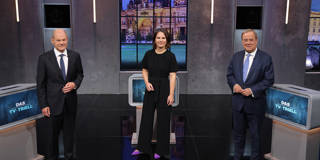It will be no small feat to fill outgoing German Chancellor Angela Merkel's shoes, but many of Germany's leading politicians have welcomed the challenge. With the most promising candidates occupying various positions in the political center, Merkel's brand of change amid stability is likely to continue.
- Friedrich Merz, Neue Zeit. Neue Verantwortung. Demokratie und soziale Marktwirtschaft im 21. Jahrhundert, Ullstein Verlag, 2020.
Olaf Scholz, Hoffnungsland: Eine neue deutsche Wirklichkeit, Hoffmann & Campe, 2017.
Sahra Wagenknecht, Die Selbstgerechten: Mein Gegenprogramm – für Gemeinsinn und Zusammenhalt, Campus, 2021.
Annalena Baerbock, Jetzt – Wie wir unser Land erneuern, Ullstein Verlag, 2021.
Wolfgang Kubicki, Meinungsunfreiheit: Das gefährliche Spiel mit der Demokratie, Westend, 2020.
Tobias Blasius and Moritz Küpper, Der Machtmenschliche: Armin Laschet. Die Biografie, Klartext,2020.
BERLIN – The current German Bundestag election campaign offers further evidence of how Germany has long been spared from the dysfunctional political party systems found in other Western democracies. While the United States buckles under an increasingly scorched-earth two-party war of attrition, the United Kingdom is routinely subjected to the Tory party’s deeply deceitful political strategies and Labour’s disingenuous fence-sitting. And France and Italy have both witnessed rapid swings that suggest disintegrating party systems.
By contrast, Germany’s party politics have changed only gradually, with what was essentially a three-party system gradually evolving into a six-party system over the course of the post-1945 period. It is a highly competitive field. A late July INSA poll put the centrist Christian Democratic Union and its Bavarian sister party, the Christian Social Union (CDU/CSU), in a comfortable lead, commanding 27% of support, compared to 18% for the Greens, 18% for the Social Democrats (SPD), 13% for the Free Democrats (FDP), 12% for the far-right Alternative for Germany (AfD), and 6% for Die Linke on the far left. In the weeks leading up to the election, however, the SPD has made a remarkable comeback and is now polling ahead of the CDU/CSU in the polls, with about 26% support, whereas both the latter (21%) and the Greens (15%) have suffered severe declines. The other parties’ popular support remained stable.
The longstanding governing coalition, comprising the CDU/CSU and the SPD, has been an unhappy one. Few in the SPD are willing even to consider extending the arrangement into a third term. Doing so should be possible numerically, but so are various other coalition arrangements. The CDU/CSU could lead a coalition in partnership with the Greens or the FDP, or the SPD could lead, with a social democratic chancellor, in partnership with the Greens and the FDP. One can also imagine the same coalition under a Green chancellor. Given these alternatives, political jockeying ahead the federal election on September 26 has been in full swing (albeit without large public rallies, owing to the pandemic).

Olaf Scholz, Hoffnungsland: Eine neue deutsche Wirklichkeit, Hoffmann & Campe, 2017.
Sahra Wagenknecht, Die Selbstgerechten: Mein Gegenprogramm – für Gemeinsinn und Zusammenhalt, Campus, 2021.
Annalena Baerbock, Jetzt – Wie wir unser Land erneuern, Ullstein Verlag, 2021.
Wolfgang Kubicki, Meinungsunfreiheit: Das gefährliche Spiel mit der Demokratie, Westend, 2020.
Tobias Blasius and Moritz Küpper, Der Machtmenschliche: Armin Laschet. Die Biografie, Klartext,2020.
BERLIN – The current German Bundestag election campaign offers further evidence of how Germany has long been spared from the dysfunctional political party systems found in other Western democracies. While the United States buckles under an increasingly scorched-earth two-party war of attrition, the United Kingdom is routinely subjected to the Tory party’s deeply deceitful political strategies and Labour’s disingenuous fence-sitting. And France and Italy have both witnessed rapid swings that suggest disintegrating party systems.
By contrast, Germany’s party politics have changed only gradually, with what was essentially a three-party system gradually evolving into a six-party system over the course of the post-1945 period. It is a highly competitive field. A late July INSA poll put the centrist Christian Democratic Union and its Bavarian sister party, the Christian Social Union (CDU/CSU), in a comfortable lead, commanding 27% of support, compared to 18% for the Greens, 18% for the Social Democrats (SPD), 13% for the Free Democrats (FDP), 12% for the far-right Alternative for Germany (AfD), and 6% for Die Linke on the far left. In the weeks leading up to the election, however, the SPD has made a remarkable comeback and is now polling ahead of the CDU/CSU in the polls, with about 26% support, whereas both the latter (21%) and the Greens (15%) have suffered severe declines. The other parties’ popular support remained stable.
The longstanding governing coalition, comprising the CDU/CSU and the SPD, has been an unhappy one. Few in the SPD are willing even to consider extending the arrangement into a third term. Doing so should be possible numerically, but so are various other coalition arrangements. The CDU/CSU could lead a coalition in partnership with the Greens or the FDP, or the SPD could lead, with a social democratic chancellor, in partnership with the Greens and the FDP. One can also imagine the same coalition under a Green chancellor. Given these alternatives, political jockeying ahead the federal election on September 26 has been in full swing (albeit without large public rallies, owing to the pandemic).